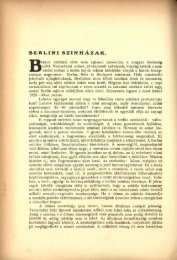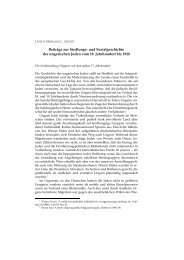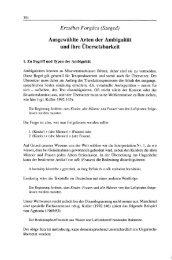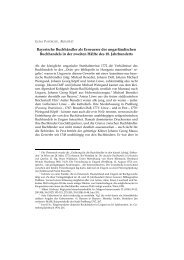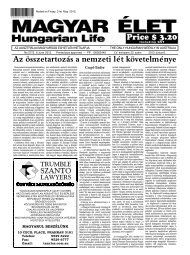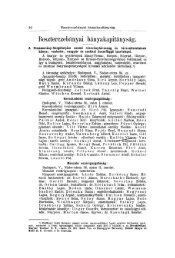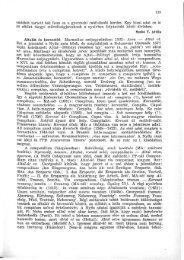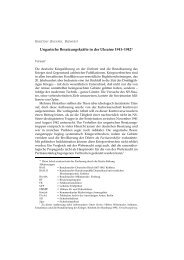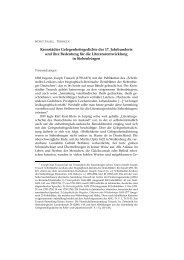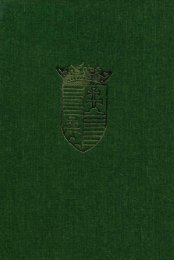hungarian studies - EPA - Országos Széchényi Könyvtár
hungarian studies - EPA - Országos Széchényi Könyvtár
hungarian studies - EPA - Országos Széchényi Könyvtár
You also want an ePaper? Increase the reach of your titles
YUMPU automatically turns print PDFs into web optimized ePapers that Google loves.
SOME QUESTIONS ON HUNGARIAN-SOVIET RELATIONS 35<br />
from Marxism. He deemed that "rotten" trends were lurking behind Nagy.<br />
Khrushchev seconded Malenkov by claiming that Nagy's article was "the best<br />
gift for the bourgeoisie; [and] Churchill is rubbing his hands" in the hope that<br />
Hungary will become a second Yugoslavia. 178 Kaganovich and Molotov both got<br />
an opportunity to take revenge for having had to disavow their own policies eighteen<br />
months earlier. Now they claimed that Rákosi was a well-respected communist<br />
and condemned Nagy's economic policy. Molotov blamed it on Beria and<br />
noted that they had warned the Hungarians that the recommendation to allow<br />
people to leave the cooperatives was only Beria's provocation. Molotov also added<br />
that without the Soviet Union's assistance the Hungarian People's Democracy<br />
could not survive. 179 There was one significant difference from 1953. Then the<br />
Soviets actually appointed Nagy and dismissed Rákosi as the premier. Now they<br />
did not put forward such a concrete "recommendation". Instead, they offered Nagy<br />
a chance to survive by exercising self-criticism. At this point Nagy offered his<br />
resignation. But this solution was not favored in Moscow because it would have<br />
signaled that the Prime Minister was in conflict with the party. The Kremlin and<br />
the Hungarian Political Committee preferred some form of public self-criticism.<br />
Consequently, the Hungarian Politburo discarded Nagy's resignation at its January<br />
13 session. On the other hand Nagy had to accept all of the elements of Soviet<br />
criticism and implement the required changes without reserve.' 80 Although the<br />
Prime Minister was not completely inimical to some measure of self-criticism, he<br />
was not willing to go to the lengths required of him by his adversaries in Hungary<br />
and the Soviet Union. At this point, Mikhail Suslov was sent to Budapest to solve<br />
the impasse. In a pattern that would subsequently be repeated, Hungarian domestic<br />
issues came under the direct guidance of a Soviet expert. The Soviet emissary<br />
not only met with Nagy on two occasions to try to negotiate a suitable solution but<br />
also participated in the March 12-14 session of the HWP Central Committee meeting.<br />
Even during the Stalin years he Soviets had not resorted to sitting in on the<br />
meetings of the Hungarian Central Committee or at any other party sessions.<br />
Mikoyan would do so again in July 1956, when Rákosi's successor had to be<br />
appointed. This time, however, it was Nagy's turn to be defeated. He was forced<br />
to resign and was then expelled, first from the Politburo and then from the party<br />
itself. Nevertheless, the genie was already out of the bottle, and it would take a<br />
massive armed Soviet intervention to usher it back in again.<br />
Nagy's removal can be understood against the backdrop of the power struggle<br />
within the Kremlin. Malenkov lost out to Khrushchev. This meant that instead of<br />
promoting a policy of peaceful coexistence, the shoring up anti-imperialist defense<br />
was determined to be the proper response to West Germany's remilitarization.<br />
Khrushchev was unable to rid himself of the notion that the final showdown with<br />
the bourgeoisie was inevitable. Hence, the Warsaw Pact required increased military<br />
contribution by the people's democracies; and the emphasis on consumer


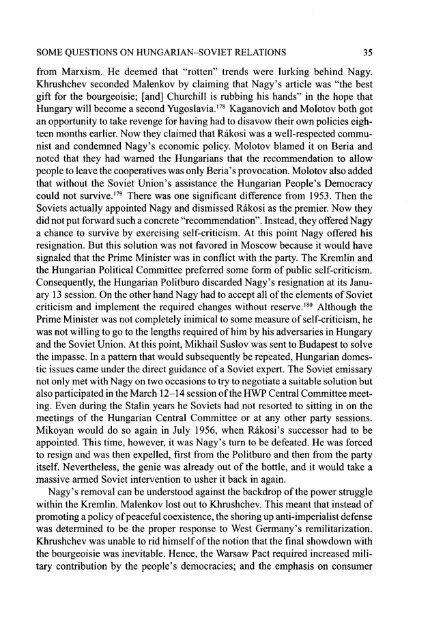
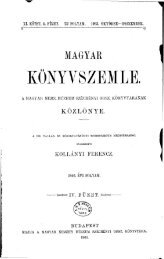
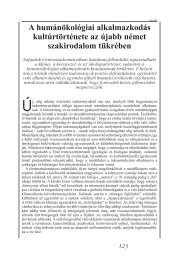
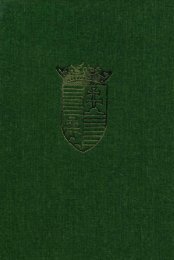
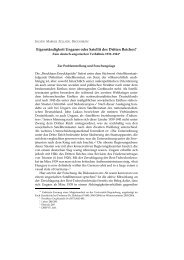
![Letöltés egy fájlban [36.8 MB - PDF] - EPA](https://img.yumpu.com/23369116/1/172x260/letoltes-egy-fajlban-368-mb-pdf-epa.jpg?quality=85)
